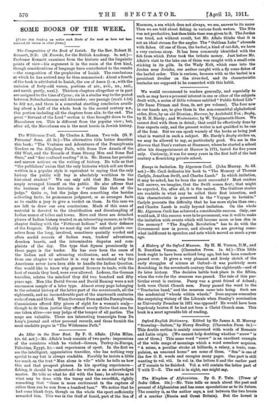The Wilderness Trail. By Charles A. Hanna. Two vols. (G.
P. Putnams' Sons. £2 2s.)—The alternative title better describes this book : "The Ventures and Adventures of the Pennsylvania Traders on the Allegheny Path, with Some New Annals of the Old West, and the Records of Some Strong Men and Some Bad Ones," and "fine confused reading" it is. Mr. Hanna has peculiar and narrow notions on the writing of history. He tells us that "the publishers' axiom that the only histories which sell are those written in a popular style is . equivalent to saying that the only history the public will buy is absolutely worthless to the historical student." We can only add that Mr. Hanna has amply revenged himself on the public. He also affirms that the business of the historian is " rather like that of the judge." Quite so, but the judge does something else besides collecting facts : he pronounces judgment, or so arranges facts as to enable a jury to give a verdict on them. In this case we are left to draw our own conclusions. Much of this mass of material is devoted to the identification and disentangling of Indian names of tribes and towns. Here and there are detached phases of Indian history treated in an interesting manner, as in the chapter dealing with the "Petticoat Indians" and their defiance of the Iroquois. Mostly we must dig out the salient points our- selves from the long, involved, sometimes quaintly worded and often sordid records of Indian wars, traders' adventures, drunken brawls, and the interminable disputes and com- plaints of the day. The type that figures prominently in these pages is the trader. He has ever been the curse of the Indian and all advancing civilisation, and as we turn from one chapter to another it is easy to understand why the Americans never have been able to handle the Indian Question. One would like to know why general licences to trade, with the host of rascals they bred, were ever allowed. Lederer, the German traveller, relates the mischief they did two hundred and fifty years ago. Men like David Owens and David Ramsay were a not uncommon sample of a later type. Almost every page belonging to the colonial history of the latter part of the seventeenth, all the eighteenth, and no inconsiderable part of the nineteenth centuries reeks of rum and blood. When Governor Penn and the Pennsylvania Commissions offered fifty pieces of eight for a woman's scalp— though to do them justice they offered nearly thrice that sum for one taken alive—one may judge of the temper of all parties. The maps are valuable. There are interesting transcripts from De Lery's journal and other personal records, and these furnish the most readable pages in "The Wilderness Path."




































 Previous page
Previous page